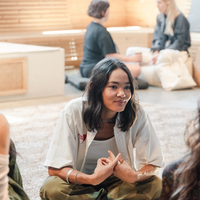Do you ever find yourself absent-mindedly scrolling through your social media app of choice only to zone-out before bedtime, find yourself restless, wide awake and unable to fall asleep instead? Social media has documented consequences when it comes to our mental and physical health, which are, of course, inextricably linked.
Here are three ways social media use impacts our physical well-being and how to curb its harmful effects.
Scrolling Thumb is a Real Thing
Doctors have spoken about increases in patients with hand and wrist issues brought on by constantly scrolling on their phones (thanks, infinite scroll.) According to Dr. Eugene Tsai, a hand and upper-extremities surgeon at Cedars-Sinai Medical Center in Los Angeles, the so-called scrolling or texting thumb is an issue in which the tendon becomes inflamed from repeated rubbing on the surrounding tunnel.
Feeling that burn? You could wear a futuristic thumb stabilizer that gives your hand a certain android-esque je ne sais quoi. But it may be easier to prevent the condition in the first place. Take breaks and make sure to stretch your hands out regularly.
Newer Media, Ancient Body Issues
By this point, it’s fair to say we all know that paying too much attention to news and celebrity culture can have a negative effect on one’s body image. Now, researchers have observed a similar link between social media, body image issues and eating disorders. It turns out all those #fitspiration videos can in fact have the opposite effect, making viewers feel worse about their own appearance and body type.
So go ahead and hit unfollow. Avoid those accounts by replacing the self-sabotaging body behavior with something positive. Do things that are actually good for your body: Take a yoga class or do some gardening. Try a walk, jog, swim or ride a bike. Look up a healthy recipe for a delicious meal you’ve always wanted to cook, instead of lurking on that gym guru’s IG Stories.
Myopia (In All the Senses)
Here’s something completely obvious: Too much screen time can cause nearsightedness. Ask any bespectacled writer—I was diagnosed with the condition after years of typing away on a computer. Also known as myopia, nearsightedness is affecting kids who have spent their school hours online during the pandemic.
It’s only logical that myopia is also a critical term for narrow-mindedness and shallow focus—the superficial ways social media gets us to think. So what’s the prescription? It’s simple: Put down the phone and get outside to widen your view and preserve your vision. Sunshine is as good for your corneas as it is your mood.
The Overall Social Media Solution? Moderation.
We have to re-train our lizard brains out of not only doomscrolling, but regular old infinite-scrolling to avoid the perils of social media-related anxiety, depression and physical health effects. The simple-but-challenging expert tip is to limit your social media use to no more than 30 minutes per day for better mental health, sleep and well-being, along with healthier hands, eyes and bodies.
Take a stroll instead of a scroll. Go on a hike. Share a meal with a friend. Offline, life awaits.
Liza Monroy is a writer based in Santa Cruz, CA. You can find her collected books, articles, and essays on lizamonroy.com and follow her on Instagram.
Read more: How to Stop Doomscrolling
Read more: How to Get Back in Sync with Your Circadian Rhythm
Read more: The Surprising Ease of a Digital Detox




